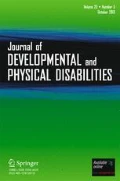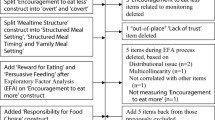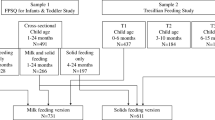Abstract
The present study identifies dimensions of feeding practices used by parents of children referred for feeding problems. These dimensions were derived from parent reported use of 17 feeding practices. This study compares these parent dimensions with child variables (age, gender, diagnosis of autism, medical conditions) as predictors of three measures of feeding problems: weight status, diet variety, and mealtime behavior problems. Participants included a clinical sample of 240 children with feeding problems. Results indicated that only child variables predicted weight status, while both dimensions of parent feeding practices and child variables predicted diet variety and mealtime behavior problems.
Similar content being viewed by others
References
Anliker, J. A., Laus, M. J., Samonds, K. W., & Beal, V. A. (1992). Mothers’ reports of their three-year-old children’s control and involvement in food-related activities. Journal of Nutrition Education, 24, 285.
Batsell, R. W., Brown, A. S., Ansfield, M. E., & Paschall G. Y. (2002). You will eat all of that!: A retrospective analysis of forced consumption episodes. Appetite, 38, 211–219.
Beautrais, A. L., Fergusson, D. M., & Shannon, F. T. (1982). Life events and childhood morbidity: A prospective study. Pediatrics, 70, 935–940.
Birch, L. L., Birch, D., Marlin, D., & Kramer, L. (1982). Effects of instrumental eating on children’s food preferences. Appetite, 3, 125–134.
De Bourdeaudhuij, I. (1997a). Family food rules and healthy eating in adolescents. Journal of Health Psychology, 2(1), 45–56.
De Bourdeaudhuij, I. (1997b). Perceived family members’ influence on introducing healthy food into the family. Health Education Research, 77–90.
Drucker, R. R., Hammer, L. D., Agras, W. S., & Bryson, S. (1999). Can mother’s influence their child’s eating behavior? Journal of Developmental and Behavioral Pediatrics, 20, 88–92.
Faith, M. S., Scanlon K., Birch, L. L., Francis, L., & Sherry, B. (2004). Parent–child feeding strategies and their relationships to child eating and weight status, Obesity Research, 12, 1711–1722.
Field, D., Garland, M., & Williams, K. (2003). Correlates of specific childhood feeding problems. Journal of Pediatrics and Child Health, 39, 299–304.
Galloway, A. T., Fiorito, L. M., Francis, L. A., & Birch, L. L. (2007). ‘Finish your soup’: Counter productive effects of pressuring children to eat on intake and affect. Appetite, 46, 318–323.
Harris, G., Blissett, J., & Johnson, R. (2000). Food refusal associated with illness. Child Psychology & Psychiatry, 5, 148–156.
Hendy, H. (1999). Comparison of five teacher actions to encourage children’s new food acceptance. Annals of Behavioral Medicine, 21, 20–26.
Jones, T. W. (1982). Treatment of behavior-related eating problems in retarded students: A review of the literature. In J. H. Hollis, & C. E. Meyers (Eds.), Life threatening behavior: Analysis and intervention (pp. 3–26). Washington, DC: American Association of Mental Deficiency.
Kedesdy, J. H., & Budd, K. (1998). Children feeding disorders. Baltimore, MD: Brookes Publishing.
Klesges, R. C., Coates, T. J., Brown, G., Sturgeon-Tillisch, J., Moldenhauer-Klesges, L. M., Holzer, B., et al. (1983). Parental influences on children’s eating behavior and relative weight. Journal of Applied Behavior Analysis, 16, 371–378.
Klesges, R. C., Malott, J. M., Boschee, P. F., & Weber, J. M. (1986). The effects of parental influences on children’s food intake, physical activity, and relative weight. International Journal of Eating Disorders, 37, 335–346.
Koivisto, U., Fellenius, J., & Sjöden, P. (1994). Relations between parental mealtime practices and children’s food intake. Appetite, 22, 245–258.
McKenzie, T. L., Sallis, J. F., Patterson, T. L., Elder, J. P., Berry, C. C., Rupp, J. W., et al. (1991). BEACHES: An observational system for assessing children’s eating and physical activity behaviors and associated events. Journal of Applied Behavior Analysis, 24, 141–151.
Mrdjenovic, G., & Levitsky, D. A. (2005). Children eat what they are served: The imprecise regulation of energy intake. Appetite, 44, 273–282.
Orrell-Valente, J., Hill, L., Brechwald, W., Dodge, K., Pettit, G., & Bates, J. (2007). “Just three more bites”: An observational analysis of parents’ socialization of chidren’s eating at mealtime. Appetite, 48, 27–45.
Palmer, S., & Horn, S. (1978). Feeding problems in children. In S. Palmer & S. Horn (Eds.), Pediatric nutrition in developmental disorders (pp. 107–129). Springfield, IL: Charles C. Thomas.
Perske, R., Clifton, A., McClean, B. M., Stein, J. I. (Eds.) (1977). Mealtimes for severely and profoundly mentally handicaped persons: New concepts and attitudes. Baltimore, MD: University Park Press.
Pliner, P., & Stallberg-White, C. (2000). “Pass the ketsup, please”: Familiar flavors increase children’s willingness to taste novel foods. Appetite, 34, 95--103.
Riordan, M. M., Iwata, B. A., Finney, J. W., Wohl, M. K., & Stanley, A. E. (1984). Behavioral assessment and treatment of chronic food refusal in handicapped children. Journal of Applied Behavior Analysis, 17, 327–341.
Rommel, N., DeMeyer, A. M., Feenstra, L., & Veereman-Wauters, G. (2003). The complexity of feeding problems in 700 infants and young children presenting to a tertiary care institution. Journal of Pediatric Gastroenterology & Nutrition, 37, 75–84.
Sanders, M. R., Patel, R. K., LeGrice, B., & Shepard, R. W. (1993). Children with persistent feeding difficulties: An observational analysis of the feeding interactions of problem and non-problem eaters. Health Psychology, 12, 64–73.
Schreck, K. A., Williams, K., & Smith, A. S. (2004). A comparison of eating behaviors between children with and without autism. Journal of Autism and Developmental Disorders, 34, 433–438.
Timimi, S., Douglas, J., & Tsiftssopoulou, K. (1997). Selective eaters: A retrospective case note study. Child: Care, Health & Development, 23, 265–278.
Vereecken, C. A., Keukelier, E., & Maes, L. (2004). Influence of mother’s educational level on food parenting practices and food habits of young children. Appetite, 43, 93–103.
Williams, K. E., Gibbons, B. G., & Schreck, K. A. (2005). Comparing selective eaters with and without developmental disabilities. Journal of Developmental and Physical Disabilities, 17, 299–309.
Author information
Authors and Affiliations
Corresponding author
Rights and permissions
About this article
Cite this article
Williams, K.E., Hendy, H. & Knecht, S. Parent Feeding Practices and Child Variables Associated with Childhood Feeding Problems. J Dev Phys Disabil 20, 231–242 (2008). https://doi.org/10.1007/s10882-007-9091-3
Received:
Accepted:
Published:
Issue Date:
DOI: https://doi.org/10.1007/s10882-007-9091-3




